Date: Monday, April 30, 2018
Message from the Executive Director
Casting a Wider Net for Organizational Growth
From Anisha Lewis, AEA Executive Director
“Growth is never by mere chance…it is the result of forces working together” – James Cash Penny, Founder JCPenney
 Growth is something for which most organizations strive. It is essential to grow each year, in order to achieve goals and accommodate the increased expenses that develop over time. For AEA, growth is essential to ensure achievement of our mission to improve evaluation practices and methods, increase evaluation use, promote evaluation as a profession and support the contribution of evaluation to the generation of theory and knowledge about effective human action.
Growth is something for which most organizations strive. It is essential to grow each year, in order to achieve goals and accommodate the increased expenses that develop over time. For AEA, growth is essential to ensure achievement of our mission to improve evaluation practices and methods, increase evaluation use, promote evaluation as a profession and support the contribution of evaluation to the generation of theory and knowledge about effective human action.
As we strive for growth, we must also stay focused on our vision to foster an inclusive, diverse and international community of practice positioned as a respected source of information for and about the field of evaluation.
Organizational growth, however, means different things to different organizations. There are many parameters that can be used to measure growth. The most meaningful yardstick is one that shows progress with respect to an organization's stated goals, followed by revenue, member engagement and impact. Growth is a necessity for us to meet the demands of the increasingly complex and dynamic field of evaluation. Growth does not only require evidence, informed decision making and focus on goals, but it requires the involvement of others to ensure achievement.
AEA’s goals set our direction for growth, and to accomplish our goals, we need to increase some key areas to maximize our impact on the profession of evaluation. I invite you to join forces with our leaders and staff by helping us to grow the following areas:
Membership
- Encourage colleagues to become AEA members
- Contact us for printable membership materials to share at events and with individuals
- If you are at a college or university, encourage your department to post AEA information on bulletins for promotion to students
- Contact us with opportunities to exhibit and recruit members
- Forward contacts for agencies, universities, international organizations and underrepresented (in AEA) places or industries where evaluators work so we can introduce them to AEA
Conference Registration
- Encourage colleagues and others in your network to attend AEA events (Summer Institute and Evaluation 2018)
- Contact us for printable materials to share at events
Revenue
- Encourage employers and others in your network to support AEA by purchasing an exhibit space at the conference or purchasing an ad in the Program Book
- Encourage your university to purchase an institutional subscription to the American Journal of Evaluation
- Promote our job board to employers, colleagues and others looking to hire evaluators
Professional Development Offerings
- Forward ideas and topics for professional development training and networking
As an organization, our commitment is to advance the profession of evaluation, and to do so by ensuring our longevity through growth. I look forward to championing the values of AEA in the field of evaluation and to coming together to expand this important work of our organization.
Walking the Talk with Abhik Roy
Taking a Closer Look at Diversity and Inclusion
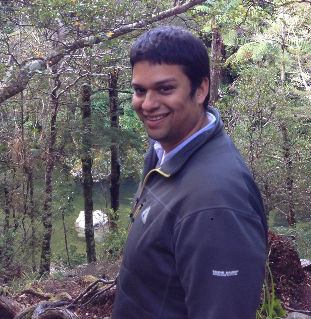
This past year I was asked to be an evaluator on a long-term grant with the sole purpose of studying issues of diversity and inclusion with the engineering departments of multiple universities. In a field that is comprised of a largely Caucasian and male workforce, attracting and retaining talent outside that group has been difficult, resulting in issues related to innovation, profit margins, changing demographics and ethics. We see this trend across many fields in academia, especially in STEM concentrations. As I wrote the proposal for the study, my thoughts kept going to the preamble of the AEA Mission, Vision, Values and Governing Policies that discusses “…inclusion and diversity in the evaluation community.” I was forced to really think about what that piece meant to me, both in context and application.
There is little doubt that some people have read that section only to reduce it to a generic statement of equity that can be glossed over. However, before we chastise those individuals, consider the effect of seeing statements of equity everywhere. At first glance, I thought this to be a sign of societal progress. The language is so commonplace now that we tend to consider it to be a societal norm, especially within the United States. If every organization has a statement relating to equality, then what could possibly be wrong with that?
The answer is many things if those words are not backed up by actions.
Have we become numb to statements that address diversity and inclusion? Possibly since it is not difficult to find examples of businesses and organizations that tout diversity and inclusion but fail to follow their own principles. In fact, without realizing it, I often dismiss statements related to equity and access, relegating them to sentences that are mandated by a law or simply there to make consumers feel good. Do businesses and organizations really believe in the concept? An optimist would say yes, but unfortunately I am a pessimist. With this said, when reading AEA’s statement, my immediate reaction is not to ignore it but rather to embrace it. This is not due to my association with the organization, rather that the foundation of AEA is grounded in the ideas of diversity and inclusion. It is this value that I find most amazing and beneficial in my day-to-day life.
Social Diversity
When there is a reference to diversity and inclusion, most of us associate those terms with equity and demographics. To its credit, AEA is constructed of members from all across the globe. As of this writing, there are 7,300 members from all 50 states in the U.S. and 80 foreign countries. These individuals bring their history, culture, abilities and identity, amongst other characteristics, to the table to make AEA one of the most diverse and fluid organizations I have ever been associated with. Each year, Evaluation feels less like a conference and more like an active society where views, research and practice are often freely discussed in forums.
Intellectual Diversity
Maybe not as apparent, I have found this type of diversity especially interesting and important. Though interdisciplinary is often used as a buzz word, the makeup of AEA affords individuals from all backgrounds an opportunity to use their specializations to study phenomena. In no other field have I seen partners reach across the content aisle to solve problems. For example, I have had the opportunity to use my knowledge of machine learning and social network analysis in conjunction with qualitative researchers, educators and social scientists to study issues related to equity and access, all under the umbrella of evaluation. I cannot imagine another field where that combination would work. In fact, in my case, and possibly as a result of my position, this notion of incorporating people with varying skills and expertise within evaluations is typical, rather than an outlier.
A Positive Outlook
It is a contentious time in the United States right now. A great political divide exists – one not seen since the Nixon era. The polarization is affecting not only our interactions with each other, but between our children, friends, coworkers and loved ones, as well. While not perfect and nor should it be, AEA represents a great model for diversity and inclusion which are informed by its values statement. The items outlined by the organization are not only worth keeping, but expanding if necessary. While words are powerful, they are meaningless without actions. I encourage the entire evaluation community to not view this point in history as a lost cause, but as an opportunity to show the entire world that policies and practices are made better with welcoming and inclusive environments.
Abhik Roy, Ph.D. is an Assistant Professor of Educational Psychology at West Virginia University. He earned his doctorate from the Interdisciplinary Ph.D. in Evaluation program at Western Michigan University. Dr. Roy currently serves as the program co-chair of the Social Network Analysis TIG.
Access the AEA Issues and Ideas Portal
The American Evaluation Association is proud to introduce the AEA Issues and Ideas Portal. AEA welcomes member input on the professional and policy issues that impact evaluators’ work and the policies that directly impact their interests. AEA members may also use this portal to submit program ideas or input for AEA Board consideration.
This mechanism allows AEA members to raise concerns, issues and opportunities related to the evaluation profession or policy to the Board of Directors for consideration on behalf of the organization. While the AEA Board cannot guarantee pursuit of every issue presented for consideration, each member will be allowed only one vote per priority and allowed to offer comments.
Members can utilize this tool to submit input on the following topics:
- Evaluation Policy: Issues and ideas related to evaluation policy in local, state and federal governments.
- Evaluation Profession: Issues and ideas impacting the evaluation profession.
- Program Ideas: Issues and ideas related to existing AEA programs.
- Board Input: Issues and ideas to be raised on the Board level related to AEA governing policy.
The AEA Management Team will compile all results and submit to the Board of Directors when the response rate for Priority Level 1 or 2 totals 2 percent of the total membership number. The Board of Directors will then consider the topic at their next meeting and will offer a response to the issue thread.
If you have any questions about this portal, please contact Zachary Grays, Natalie DeHart or Milos Popovic at info@eval.org or 202.367.1166.
Call for Applications
AEA Graduate Education Diversity Internship (GEDI)
Deadline: Thursday, May 24, 2018
From Zachary Grays, AEA Headquarters
The American Evaluation Association (AEA) welcomes applications for its Graduate Education Diversity Internship (GEDI) Program that provides paid internship and training opportunities during the academic year. The GEDI program works to engage and support students from groups traditionally under-represented in the field of evaluation. The goals of the GEDI Program are to:
- Expand the pool of graduate students of color and from other under-represented groups who have extended their research capacities to evaluation
- Stimulate evaluation thinking concerning under-represented communities and culturally responsive evaluation
- Deepen the evaluation profession's capacity to work in racially, ethnically and culturally diverse settings
Interns may come from a variety of disciplines, including public health, education, political science, anthropology, psychology, sociology, social work, and the natural sciences. Their commonality is a strong background in research skills, an interest in extending their capacities to the field of evaluation, and a commitment to thinking deeply about culturally responsive evaluation practice.
Before applying for this program, please review the eligibility requirements and expectations:
The Internship: Building on the training content described below, the interns work the equivalent of approximately two days per week at an internship site near their home institutions from approximately Sept. 1 to July 1. The interns may work on a single evaluation project or multiple projects at the site, but all internship work is focused on building skills and confidence in real-world evaluation practices. Interns receive a stipend of $10,000 in recognition of their internship work based on completion of the internship and satisfactory finalization of program requirements, including any deliverables due to the host agency, progress reports, and reflections on the internship experience.
Training and Networking Components: It is assumed that students come to the program with basic qualitative and quantitative research skills. The GEDI Program then works to extend those skills to evaluation through multiple activities:
- Fall Seminar: A five-day intensive seminar, held in Claremont, California, that provides an orientation that expands the student's knowledge and understanding of critical issues in evaluation, including thinking about building evaluation capacities to work across cultures and diverse groups. The interns complete a self-assessment in the Fall, clarifying their own goals during program participation.
- AEA Annual Conference: Interns will spend a week at the AEA annual conference. While there, they will attend (a) pre-conference workshops selected to fill gaps in their knowledge and skills, (b) conference sessions exploring the breadth and depth of the field, and (c) multiple networking events to connect them with senior colleagues. The interns also conduct a small-service learning project in the form of an evaluation of one component of the conference.
- Winter Seminar: A three-day seminar, held in January or February, provides the students with additional training, coaching on their evaluation projects, and panel discussions with evaluation practitioners working in a range of contexts.
- Evaluation Project: Interns will have the opportunity to provide support to an agency's evaluation activities in close proximity to their graduate institution. Interns will provide three updates on their evaluation project activities as part of the internship program, describing and reflecting on the application of their evaluation knowledge to the actual project activities.
- Monthly Webinars:The students gather each month for a two-hour webinar to check in on evaluation projects and site placements, add to existing skill-sets, and learn from invited guest speakers.
- AEA/CDC Summer Evaluation Institute: The program ends with attendance at the Summer Evaluation Institute held in Atlanta each June. There, students once again connect and finalize project reporting, attend training workshops, and participate in a graduation ceremony.
Student Benefits: Interns receive support from advisors and mentors, quality training focused on evaluation, real-world work experience, registration waivers and guidance at two professional evaluation conferences, and multiple opportunities for professional networking. In recognition of the time involved in the program (approximately two days per week), each intern also receives a stipend and is reimbursed for major travel expenses related to the program (airfare and shared hotel specifically), but is responsible for travel incidentals (to and from home/airport, to/from hotels, meals not taken together, etc.).
Eligibility: We seek students who are not already enrolled in an evaluation program/specialization or pursuing an evaluation degree who:
- Are enrolled in a masters or doctoral-level program in the United States and have completed the equivalent of one full year of graduate level coursework;
- Are residing in the United States;
- Have already been exposed to research methods and substantive issues in their field of expertise;
- Demonstrate via written essays the relevance of evaluation training to their career plans and their commitment to culturally responsive practice;
- Are eligible to work for pay in the United States outside of an academic environment (non-U.S. citizens will be asked to provide documentation of current eligibility); and
- Have support from his/her academic advisor.
Criteria for Selection: The interns will be selected based on their completed applications, materials provided, and subsequent finalist interviews focusing on:
- Their thinking around and commitment to culturally responsive evaluation practice;
- The alignment between their skills, aspirations, locale, and internship site placement needs;
- The quality of their academic, extracurricular, and personal experiences as preparation for GEDI; and
- Their capacity to carry out and complete the program, including support from an academic advisor.
To apply: Download the GEDI Application and return all requested materials via email as described on that document on or before Thursday, May 24, 2018. Please note that it may take a few weeks to compile the requested information and thus we recommend that you begin as soon as possible before the deadline.
Introducing the Digital Knowledge Hub

AEA introduces the Digital Knowledge Hub, an online platform featuring professional development opportunities for evaluators, by evaluators. AEA has improved the current professional development website to allow for a more streamlined and cohesive experience and provide a go-to resource for members to access AEA’s professional development content online, at any time.
This tool will continue to develop over the next year with new learning opportunities such as online courses and the Evaluation 2018 conference recordings for the evaluation community to enjoy.
American Journal of Evaluation Editor Announcement
AEA Appoints Dr. George Julnes as Editor-in-Chief
 AEA is pleased to announce the appointment of Dr. George Julnes, Professor of Public and International Affairs at the University of Baltimore, as incoming Editor-in-Chief of American Journal of Evaluation. His scholarship as an evaluation theorist has been recognized with AEA’s highest honor, the Paul F. Lazarsfeld Award. Dr. Julnes combines expert scholarship with extensive experience as an evaluation practitioner and teacher. A senior scholar of international renown, Dr. Julnes brings deep knowledge and appreciation of diverse aspects of evaluation’s theory, methods, and practice to his role as editor.
AEA is pleased to announce the appointment of Dr. George Julnes, Professor of Public and International Affairs at the University of Baltimore, as incoming Editor-in-Chief of American Journal of Evaluation. His scholarship as an evaluation theorist has been recognized with AEA’s highest honor, the Paul F. Lazarsfeld Award. Dr. Julnes combines expert scholarship with extensive experience as an evaluation practitioner and teacher. A senior scholar of international renown, Dr. Julnes brings deep knowledge and appreciation of diverse aspects of evaluation’s theory, methods, and practice to his role as editor.
“I am so pleased to share that the Publications Task Force recommended, and the AEA Board approved, the appointment of George Julnes as the next Editor-in-Chief of the American Journal of Evaluation,” said Leslie Goodyear, PhD. “George’s contributions to the theory and practice of evaluation are too numerous to list here, but I want to highlight his deep appreciation of diverse evaluation methods, the importance of contextual factors in evaluation and the critical relationship between evaluation theory and practice. His experiences in multiple roles in AEA – for example, the EPTF, as a TIG chair, as a member of the International Working Group and the Race and Class Dialogues Working Group and as the section co-editor for the Professional Values and Ethics section of AJE – will no doubt inform his approach to the editorship. The AJE is in great hands and I encourage AEA members to connect with George to learn more about his vision. Thanks to the hard working members of the Publications Task Force for their commitment to this important process.”
Said Dr. Julnes of the appointment: “It will be both daunting and an honor to follow my illustrious predecessors — Mel Mark, Robin Miller, Tom Schwandt, and, currently, Sharon Rallis — as the Editor-in-Chief of the American Journal of Evaluation.”
Feedback Needed: AEA and The Gordon and Betty Moore Foundation Webinar
AEA,with support from The Gordon and Betty Moore Foundation, will offer a series of professional development webinars in 2018 focused on some of the most gripping and relevant topics facing evaluators, the evaluation profession, and evaluators producing evaluations funded by philanthropic foundations. In curating these special offerings, we would like your input on the planned topics and recommendations for future webinars as well as recommendations for global expertise in these areas. Please tell us what you would like to learn from these topics and/or how you have addressed these challenges in your work as evaluators. In addition, we’d like to get your ideas for other salient topics you wish to explore for future webinars.
Click Here to Provide Feedback
Please recommend specific thought leaders who would make excellent presenters in each of the topics or proposed additions. Recommended presenters should be able to demonstrate a comprehensive understanding and background in the topics. If you would like to submit additional ideas, please include in the ‘Other Ideas’ section. Your thoughtful and valuable discussion/feedback will inform the creation of these upcoming offerings. These webinars will be free of charge and open to the public as a resource to all evaluators. Please provide all feedback no later than Wednesday, May 16, 2018. For questions, contact Zachary Grays at zgrays@eval.org.
Join the AEA Board for Virtual Town Halls
Meetings Confirmed for April, May and June
From AEA Headquarters
The Board of Directors would like the opportunity to engage more with AEA members and discuss a variety of strategic and visionary topics with the membership. The virtual Town Hall approach allows a regular opportunity to pose strategic questions and topics to the membership for input.
The Board will use the GoTo Meeting platform with a Q&A feature for receiving and addressing questions. President Leslie Goodyear will host 30-60 minute sessions. The following session topic and guest facilitators have been confirmed.
AEA June Town Hall: AEA Guiding Principles Review
Friday, June 15, 2018 at 2 p.m. ET
AEA President Leslie Goodyear will be joined by AEA Member Beverly Parsons to discuss the AEA Guiding Principles. Register here.
International Evaluation Update
Supporting International Evaluation through IOCE
From Cindy Clapp-Wincek and Shawna Hoffman
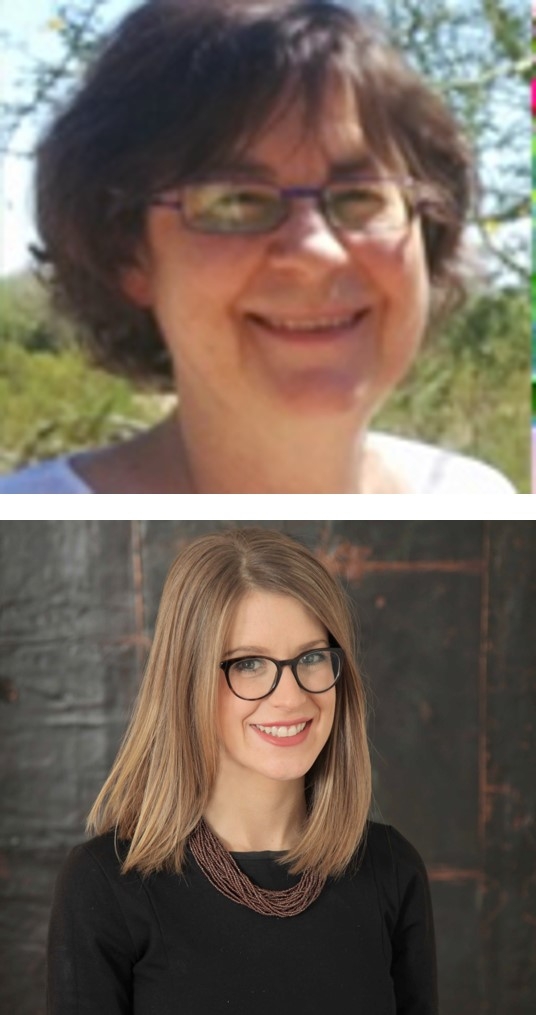 One way AEA supports international evaluation capacity building is through the International Organization for Cooperation in Evaluation (IOCE) and EvalPartners. The IOCE represents international, regional, national, and sub-national Voluntary Organizations for Professional Evaluation (VOPEs) worldwide. It strengthens international evaluation through the exchange of evaluation methods and promotes good governance and recognition of the value evaluation has in improving peoples’ lives. This column has shared information on EvalPartners and its initiatives for Gender+, Indigenous, Youth, Parliamentarians, and Sustainable Development Goal evaluation.
One way AEA supports international evaluation capacity building is through the International Organization for Cooperation in Evaluation (IOCE) and EvalPartners. The IOCE represents international, regional, national, and sub-national Voluntary Organizations for Professional Evaluation (VOPEs) worldwide. It strengthens international evaluation through the exchange of evaluation methods and promotes good governance and recognition of the value evaluation has in improving peoples’ lives. This column has shared information on EvalPartners and its initiatives for Gender+, Indigenous, Youth, Parliamentarians, and Sustainable Development Goal evaluation.
IOCE gives Peer to Peer (P2P) grants to help strengthen VOPEs’ capacity to support their evaluator members — and others interested in evaluation — and to promote quality evaluation that makes a difference. AEA members have shown a strong interest in supporting international capacity development. Recently, the IOCE was looking for reviewers for P2P grant proposals. Our colleagues on the ICCE TIG responded so enthusiastically that we had many more volunteers than were needed. Building on that enthusiasm, we wanted to talk about other ways that AEA members could support international capacity development.
Several AEA affiliates have participated in P2P grants working with VOPEs from overseas, for example, local affiliate Washington Evaluators worked with a VOPE from Kyrgyzstan. If there are other affiliates (each considered a “VOPE” in IOCE parlance) that would like to partner with VOPEs from overseas, please let AEA representative to IOCE Cindy Clapp-Wincek know (clappwincek@gmail.com). Having members that speak other languages is a plus but not a requirement. If you have a particular skill set that you would like to share, that would also be helpful to know. This may perhaps include work with nonprofit evaluation, governance evaluation or recent success in expanding affiliate membership.
Individual AEA members can also volunteer to support capacity development worldwide. Key projects of the IOCE are :
- The Professionalization Task Force, intended to support VOPEs in their professionalization efforts. The Task Force is actively seeking input at the moment. See the website here for details.
- The VOPE Toolkit, which could use more resources, and the VOPE Verification Task Force.
- The VOPE Directory lists 122 VOPEs around the world. Although there are not ways to volunteer at the moment, there should be in the near future.
There are many more opportunities to volunteer with IOCE’s initiative, called EvalPartners. There are networks for EvalIndigenous, EvalGender+, EvalYouth and EvalSDGs. There is also a task force for Parliamentarians. You can find more info on evalpartners.org. Click the link for "Networks/Task Forces." We encourage you to get involved!
Potent Presentations Initiative
You, the Presenter! What We Learned from 190 Respondents: Part III
From Sheila B. Robinson, Potent Presentations Initiative Coordinator
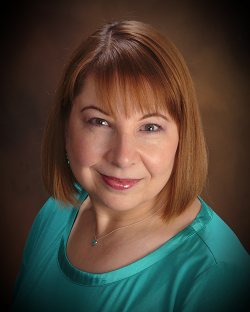
In February’s article, I shared results from a Potent Presentations Survey called “You, the Presenter: What Would Help You Up Your Game?” I shared who respondents were, what types of presentations they most often give and types of presentations they anticipate giving in the future. In March’s article, I shared what respondents identified as priority areas for improving their presentation practice.
This month, I’ll continue with what respondents identified as priority areas for improving their presentation practice. The survey included three questions designed to elicit this.
- What is one aspect of giving presentations you would like to improve in your own practice? (open-ended question)
- The Potent Presentations Initiative (P2i) divides presentations into key elements: Messaging, Design and Delivery, along with Audience Engagement. In which of these areas would you MOST like to improve your presentation practice?
- Messaging: crafting the central message or content of your presentation
- Design: crafting slides or other visuals to accompany your presentation
- Delivery: your public speaking skills
- Audience Engagement: engaging audience members and crafting interactive components of a presentation
- Which of these areas would be your second priority for improvement?
- Messaging: crafting the central message or content of your presentation
- Design: crafting slides or other visuals to accompany your presentation
- Delivery: your public speaking skills
- Audience Engagement: engaging audience members and crafting interactive components of a presentation
- None of these – I don't have a second priority
Audience engagement came out soundly on top for first priority, followed by design, messaging and delivery. Messaging inched out as the top second priority area, followed by audience engagement, design and delivery. Last month I shared specific data points on audience engagement and messaging. This month, the focus is on design and delivery.
For Design, many respondents mentioned the desire to be better at data visualization and slide design, and described these needs:
- Conveying statistical concepts to a broad audience
- Improve my technology skills and to learn how to use different visualizations and formats that are also more engaging
- Figure out how to embed more engaging, interactive components … always looking for new visual techniques to get content across in a memorable, engaging way
- How to present scientific findings and programmatic information in a more engaging way
- Graphics that display information in interesting, easy-to-grasp, memorable ways
- Matching images with points I make in my presentation
- Developing more impactful visuals
For Delivery, many respondents mentioned the need to improve their confidence for public speaking, and the interest in improving their storytelling. They also described these needs:
- How to sound conversational & friendly while remaining authoritative & expert
- using humor
- being a dynamic speaker
- More engaging, informal, interactive, funny, free-flowing
- Delivering information that is difficult for people to hear, preventing and diffusing defensive reactions
- How to facilitate dialogue/discussions
Stay tuned! In future articles you’ll learn what formats respondents prefer for learning about presentations, and who their favorite presenters are.
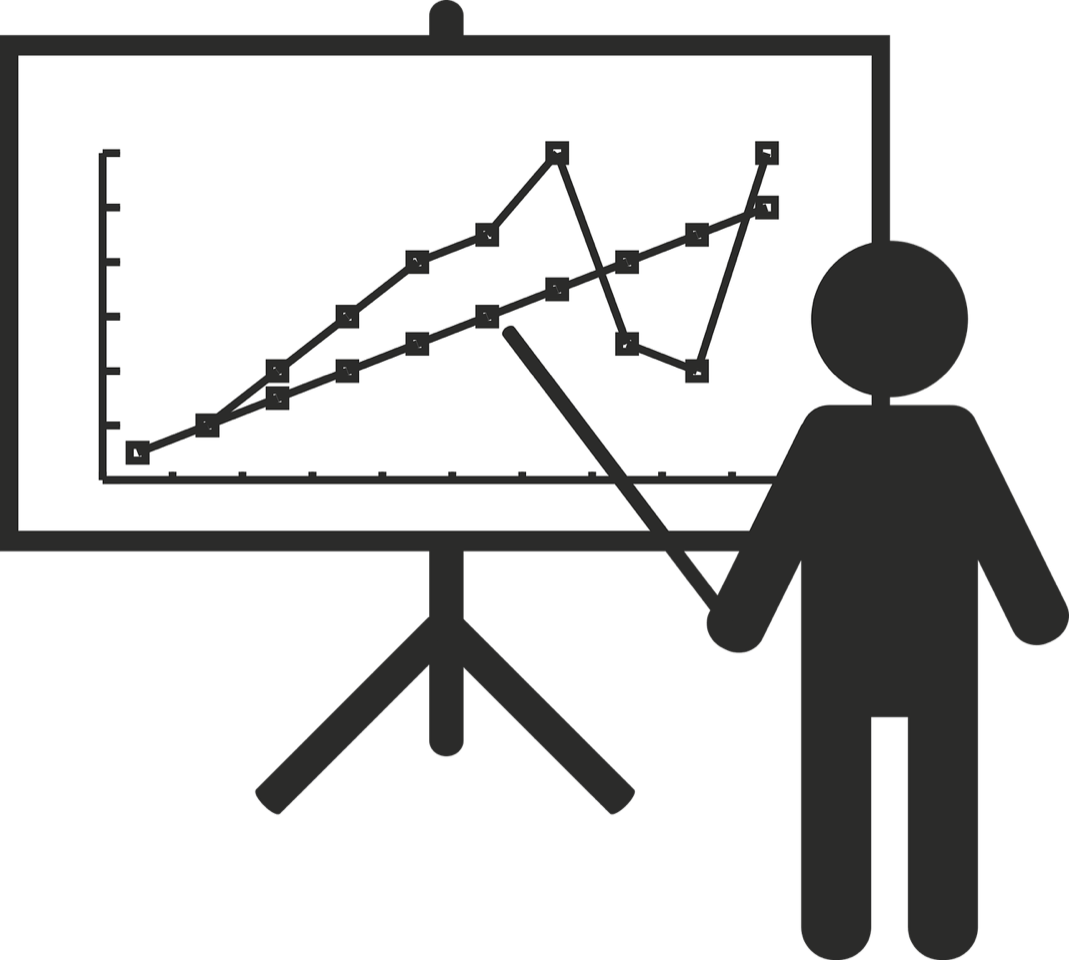
p2i Needs Your Help!
- Have you successfully used p2i tools or p2i principles in your presentations?
- Do you have “before” and “after” slide examples you would be willing to share?
- Do you have ideas for, or are you interested in writing a blog article on Potent Presentations?
- Do you have an interest in sharing your tips for Potent Presentations through a brief video or webinar?
Please contact me at p2i@eval.org and let’s talk! I’m happy to help, offer guidance, or collaborate on any of these.
AEA Coffee Breaks and eStudy Courses
Take Advantage of Online Learning Sessions with AEA
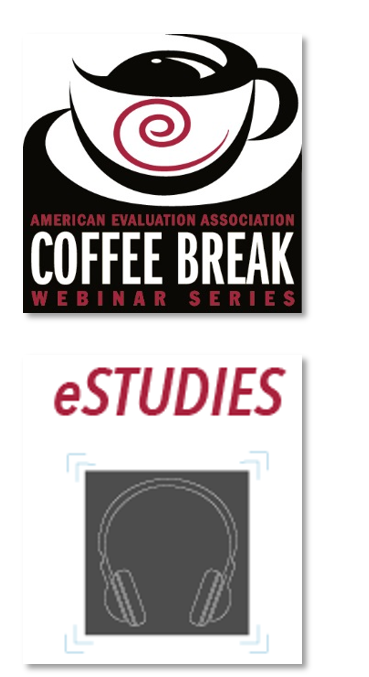 Whether you're looking for a short break to brush up on skills, or a longer study session with thought-leaders, AEA offers several ways to continue learning. List below is a preview of May and June e-learning sessions. Detailed descriptions and links to register are available on
Whether you're looking for a short break to brush up on skills, or a longer study session with thought-leaders, AEA offers several ways to continue learning. List below is a preview of May and June e-learning sessions. Detailed descriptions and links to register are available on
the AEA Coffee Break page or AEA eStudy page.
Coffee Breaks May – June
- Using Qualitative Methods Effectively: The Why and the How (May 1)
- Observation and Participant Observation: What Should we be Observing and How Can We Do It? (May 15)
- Interviewing 101: The Why and the How (May 29)
- Focus Groups: Developing your Questioning Route (June 5)
- Participatory Tools: The Why and the How (June 12)
eStudy Sessions May – July
- eStudy 088: The Seven Habits of Highly Utilized Evaluations (May 15, 17)
- eStudy 089: Introduction to Stakeholder Engagement for Complex Contexts (June 5, 7)
- eStudy 091: Designing Useful Surveys (July 17, 19)